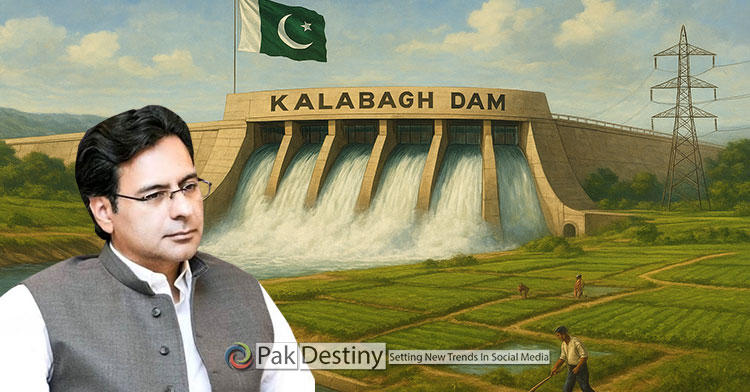
By Zulqernain
It’s time to debate that Kala Bagh Dam (KBD) should be built without any further delay for the sake of Pakistan.
“Kalabagh Dam is not just a project. It is Pakistan’s survival plan. With Khyber Pakhtunkhwa now supporting it, we are one step closer to securing our water, energy, and future. The nation now looks towards Sindh to rise above politics and join this consensus,” PTI senior leader and former federal minister Moonis Elahi said in a post on his X account.
کالاباغ ڈیم کے حق میں خیبر پختونخوا رضامند۔ وزیراعلٰی خیبر پختونخوا علی امین گنڈاپور کی کالاباغ ڈیم کی حمایت پورے پاکستان کیلئے ان حالات میں ایک بڑی خوشخبری۔ سندھ سے بھی ایسی اچھی خبر کا انتظار۔ #BuildKalabaghDam
— Moonis Elahi (@MoonisElahi6) September 2, 2025
Moonis Elahi said: “Khyber Pakhtunkhwa agrees in favour of the Kalabagh Dam. Chief Minister Ali Amin Gandapur’s support for the project is a major piece of good news for the entire nation in the current circumstances. A similar positive development is awaited from Sindh as well. #BuildKalabaghDam.”
Mr Moonis believes that Khyber Pakhtunkhwa’s support for Kalabagh Dam is a turning point.
The announcement of Khyber Pakhtunkhwa’s support for the Kalabagh Dam is being hailed as a landmark development in Pakistan’s long-debated water and energy policies
KP Chief Minister Ali Amin Gandapur’s backing of the project marks a shift from decades of opposition within KP and signals the possibility of a new consensus.
“For nearly four decades, Kalabagh Dam has remained one of the most divisive national projects. Punjab strongly advocated for its construction, emphasizing benefits such as cheap hydropower, better water storage, and effective flood control,” Mr Moonis says and adds Gandapur’s endorsement is being seen as “good news” for the federation.
“It reinforces the argument that the dam can help Pakistan overcome its worsening water crisis, reduce reliance on expensive imported fuel, and provide a shield against climate-driven floods,” Mr Moonis said.
As this development may reduce political polarization around the project and strengthens hopes for broader national agreemen, Sindh, Balochistan and KP had historically resisted, fearing loss of water share, submergence of fertile lands, and damage to their local economies.
The major challenge now rests with Sindh, where opposition remains strong due to concerns about reduced downstream flows to the Indus Delta, agricultural impacts, and ecological degradation.
Unless Sindh is brought on board through assurances and transparent mechanisms, the project may not move forward.
If Sindh also signals willingness to reconsider, Pakistan could witness a historic breakthrough.
The dam could transform irrigation, generate thousands of megawatts of low-cost electricity, and protect vulnerable communities from recurring flood disasters. In the current context of energy shortages, climate stress, and economic instability, KP’s support offers hope for a more secure and self-reliant future.
Pakistan, which is among the top 10 countries most vulnerable to the impact of climate change, desperately needs solutions to its problems of water shortages and droughts, devastating floods, erosion of the Indus delta, which is displacing local communities, and so on. These issues can not be resolved by stopping the river flows through dams.
At a time when Pakistan needs unity more than ever, with floods wreaking devastation in several parts of the country and an economy on the brink, it is crucial that our rulers started to think beyond brick-and-mortar structures — if, indeed, they want to solve our increasing climate-related challenges. PAK DESTINY






